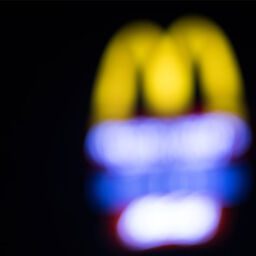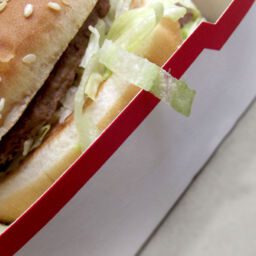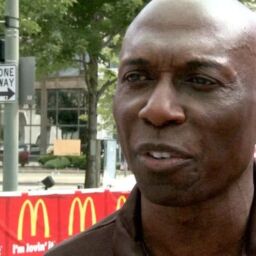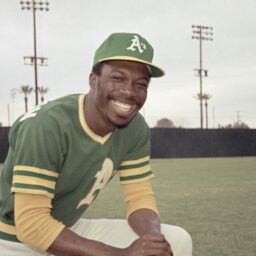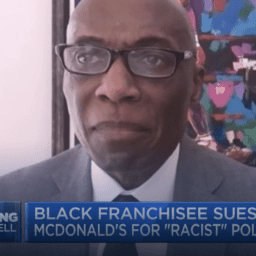“Herb Washington, a former Oakland Athletics player who built the country’s largest Black-owned McDonald’s franchise operation, filed a lawsuit Tuesday accusing the fast-food giant of systemic racial discrimination for its pattern of steering Black owners into restaurants in impoverished neighborhoods that yielded less profit, targeting them with unequal assessments that made it harder to renew their contracts, then pressuring them to sell to White owners.
Washington, 69, owned 27 McDonald’s restaurants in New York, Ohio and Pennsylvania during his four decades as a franchisee but alleged that the company began a campaign to drive him out in 2017 in retaliation for speaking about the “predatory, racially biased steering practices” against Black franchisees. Today he owns 14 McDonald’s restaurants, he said, having been forced to sell seven stores in the last three years alone to White owners.
“McDonald’s has targeted me for extinction,” Washington said during a Zoom press conference from his home, appearing in a gray suit and black tie before a painting of Muhammad Ali knocking out Sonny Liston. “It took every ounce of me to succeed against the incredible and unfair odds that McDonald’s forced on me.”
Washington said he’s suing to end McDonald’s “two-tiered system where Black owner operators cannot be as successful as Whites. There is a system for them and one for people who look like me.” He said he represents many Black franchisees who left McDonald’s broke because of that system.
The lawsuit, filed in federal court in Ohio, accused McDonald’s of hypocrisy, joining corporations releasing statements proclaiming Black Lives Matter while “it has done nothing to change its own internal policies that perpetuate systemic racism by disadvantaging and squeezing out its Black franchise owners.”
McDonald’s responded to the lawsuit Tuesday by blaming Washington for his business challenges.
“This situation is the result of years of mismanagement by Mr. Washington, whose organization has failed to meet many of our standards on people, operations, guest satisfaction and reinvestment,” McDonald’s said in a statement. “His restaurants have a public record of these issues including past health and sanitation concerns and some of the highest volumes of customer complaints in the country.”
The company said it invested significantly in Washington’s franchise, helped him sell restaurants as part of his business improvement plan, and offered him multiple opportunities to address the concerns. Washington said McDonald’s recent investments amounted to just $6 a day per restaurant to help narrow the gap between his sales and his White counterparts.
52 former franchisees accuse McDonald’s of racial discrimination in lawsuit
Washington’s lawsuit comes amid an alarming exit of Black franchisees from McDonald’s and widespread allegations of racial bias. Last fall 52 Black former franchise owners sued McDonald’s for setting them up to fail despite the company’s public commitment to racial equity. McDonald’s denied the allegations and said it was committed to diversity and equal opportunity across its franchisees.
The decline in Black restaurant owners accelerated after Steve Easterbrook and Chris Kempczinski became presidents and chief executives of McDonald’s Corporation and McDonald’s USA, according to Washington’s lawsuit.
Black franchise ownership is at an all-time low today. In 1998, there were 377 Black franchisees in the McDonald’s system, according to the lawsuit. Now there are 186.
“These numbers are not a coincidence; they are the result of McDonald’s intentionally racist policies and practices toward Black franchisees,” Washington’s lawsuit alleges.
McDonald’s said that the company has seen a reduction in the total number of franchise organizations across all demographic groups in recent years, and that the overall representation of Black operators remains broadly unchanged.
Black senior executives who objected to the company’s policies suffered swift retaliation, the lawsuit alleged. During Easterbook’s and Kempczinski’s leadership, the number of Black executives dropped from 42 to seven.
Washington’s lawsuit alleges McDonald’s system is stacked against Black franchisees who make, on average, $700,000 less in annual sales per store than White owners, which he said directly results from the company’s discriminatory policies that favor White owners.
McDonald’s charges fees to franchisees for the right to operate a restaurant for 20 years, typically on land and in buildings owned by the company. Franchisees make minimum monthly base rent payments on top of rent payments calculated on a percentage of gross sales revenue, an amount that varies from store to store. Owners pay all operational costs, including property tax and maintenance, monthly service fees and royalties calculated on the percentage of sales, as well as contribute to collective advertising. At the end of the 20-year term, the lease must be renewed for franchisees to continue operating — a key point when McDonald’s can cap their growth.
The disparities compound when Black owners such as Washington are required to incur disproportionately high operational costs and low sales volume, the lawsuit alleges. The company grants rent relief at its discretion. But Washington alleges McDonald’s disproportionately helps White franchisees while refusing similar requests from Black owners.
Washington, a former Michigan State track star who went on to help the Oakland A’s win the World Series in 1974, became a McDonald’s franchisee in 1980 at age 29. His first restaurant was located next to a public housing development in Rochester, N.Y., after the company steered him to a store in a distressed, predominantly Black neighborhood as his only option to enter the McDonald’s system, his lawsuit said.
“I took nothing and made something of it,” Washington said Tuesday. “I was not given the break that McDonald’s routinely extends to White owners to ensure they are successful.”
When stores became available in suburban Rochester in the early 1990s, Washington said McDonald’s blocked the sale even though he had struck a deal with the White owner to purchase the restaurants. Instead, the company approved the sale to a White owner. The field-office executive who blocked the sale, Mike Andres, went on to become president of McDonald’s USA.
Around 2011, Washington said he had finalized a deal to purchase a store in the predominantly White suburb of University Heights near Cleveland — but said McDonald’s intervened and awarded the store to a White operator.
A McDonald’s spokesman told The Post the company does not place franchisees into specific restaurants. It only makes recommendations, and the franchisees are the ones who decide which restaurants they purchase and to whom they sell. The company said Black franchisees operate restaurants in rural, urban and suburban communities.
After Washington complained that inner-city stores were losing value while White suburban stores continued to prosper and that Black franchisees’ stores were being evaluated unfairly within a corporate franchising committee, he said he was removed from the committee, according to the lawsuit.
Washington said McDonald’s demanded that he make massive capital investments into the same restaurants it would eventually take from him — expenditures that benefited White franchisees the company had approved to purchase his stores.
The mandate to quickly modernize restaurants under Easterbrook’s and Kempczinski’s leadership forced Black franchisees who had successfully managed to operate low-volume stores at a profit to take on increasing debt, creating a growing cash-flow gap, the lawsuit said. Washington accused McDonald’s of accommodating White franchisees’ requests for more time to complete the required renovations while denying the same opportunity to most Black franchisees.
The company then used their failure to renovate as a reason to deem Black franchisees ineligible for expansion and renewal of their contracts, the lawsuit said; those who were able to remodel suffered economic setbacks that made it possible for McDonald’s to cycle them out of the system at a lower buyback price.
“McDonald’s offered a publicly-facing anti-racist message, but its race-based steering policies hamstrung Black franchisees and prevented them from ever achieving equality with their White counterparts,” the lawsuit said. “Those policies and practices continue to injure Black franchisees to this day as they struggle to remain viable business owners in the face of McDonald’s unreasonable demands. Now McDonald’s is driving Black franchisees from its system by exploiting the very inequalities its long-standing discriminatory practices have caused.”
The lawsuit accused the corporation of using these newly White-owned low-volume stores to drag down the overall performance figures of White franchisees, creating the illusion of parity without truly diversifying the mix of stores that Black franchisees are able to own.
Washington said that McDonald’s is also restricting the transfer of Black intergenerational wealth. He said that after he became more vocal in his criticisms, his son, who graduated from a McDonald’s training program, was deemed ineligible to purchase any restaurants — from Washington or anyone else.
While it may look like a “multicultural mecca from the outside,” Washington said, it’s a “redline and retaliation” on the inside.
“I can’t breathe,” he said. “The corporate knee of McDonald’s has been on my neck for 40 years.””
The Washington Post | Tracy Jan | February 16, 2021
Civil Rights Lawsuits | FREE Consultation
Peiffer Wolf Carr Kane & Conway is a nationally recognized law firm. Our team of attorneys is fully prepared to assist our clients, protect their privacy, and guide them through the process in Civil Rights cases. If you or a loved one has been the victim of discrimination based on race, gender, sexual orientation, national origin, and/or religion, Contact Us immediately. You can fill out an online contact form or call 216-589-9280 for a FREE Consultation. Remember: everything you share with your lawyer is confidential.




